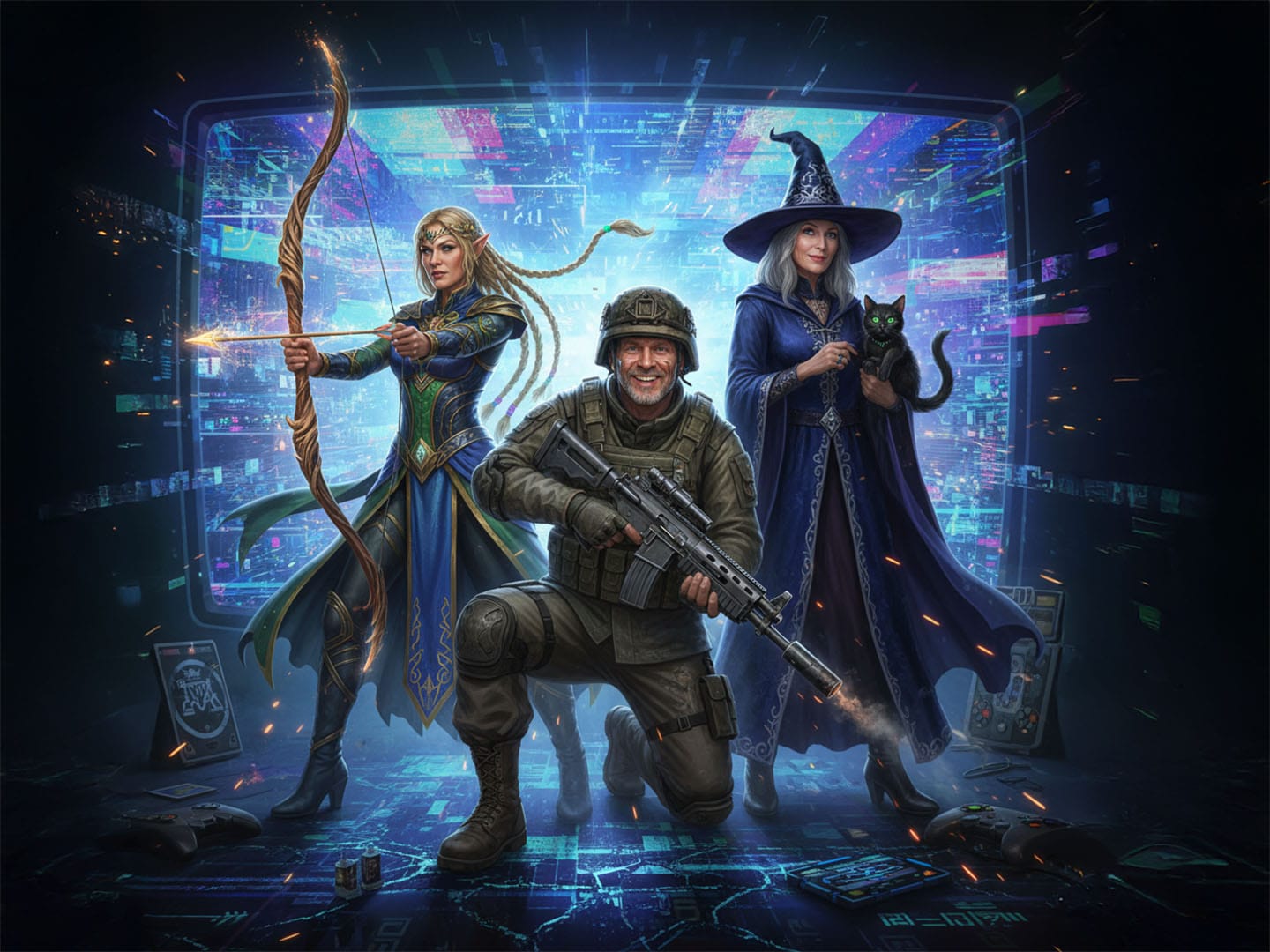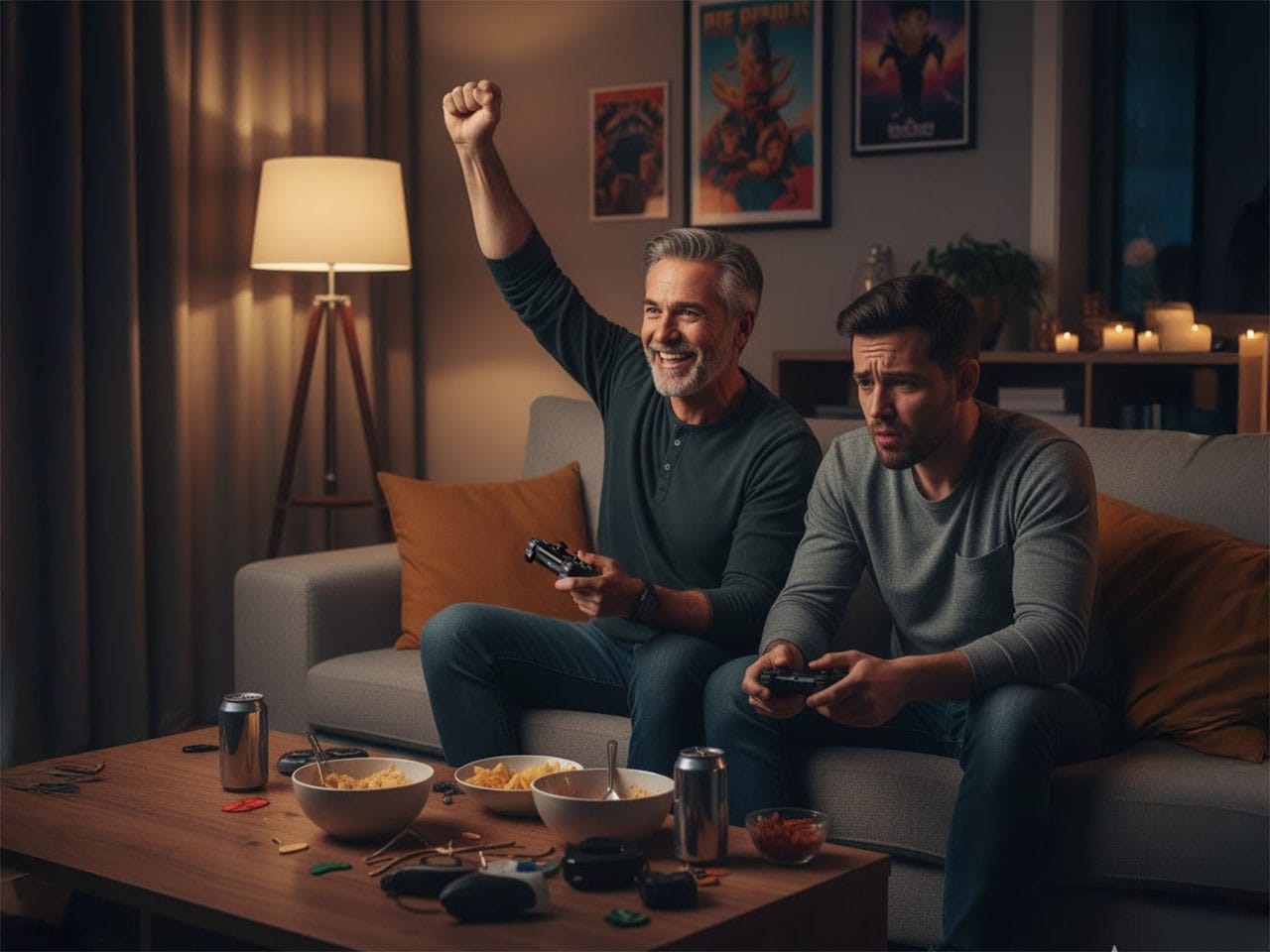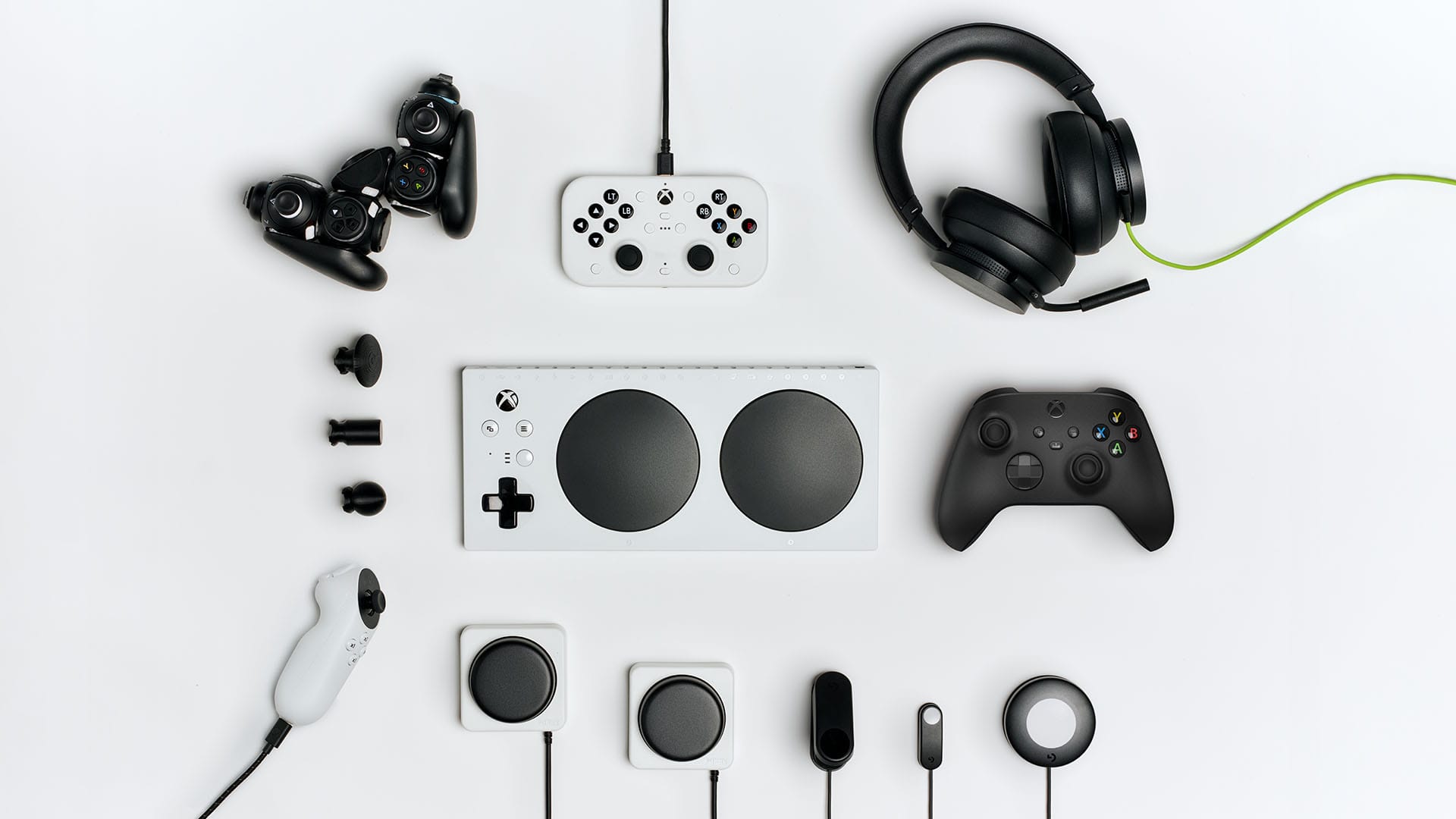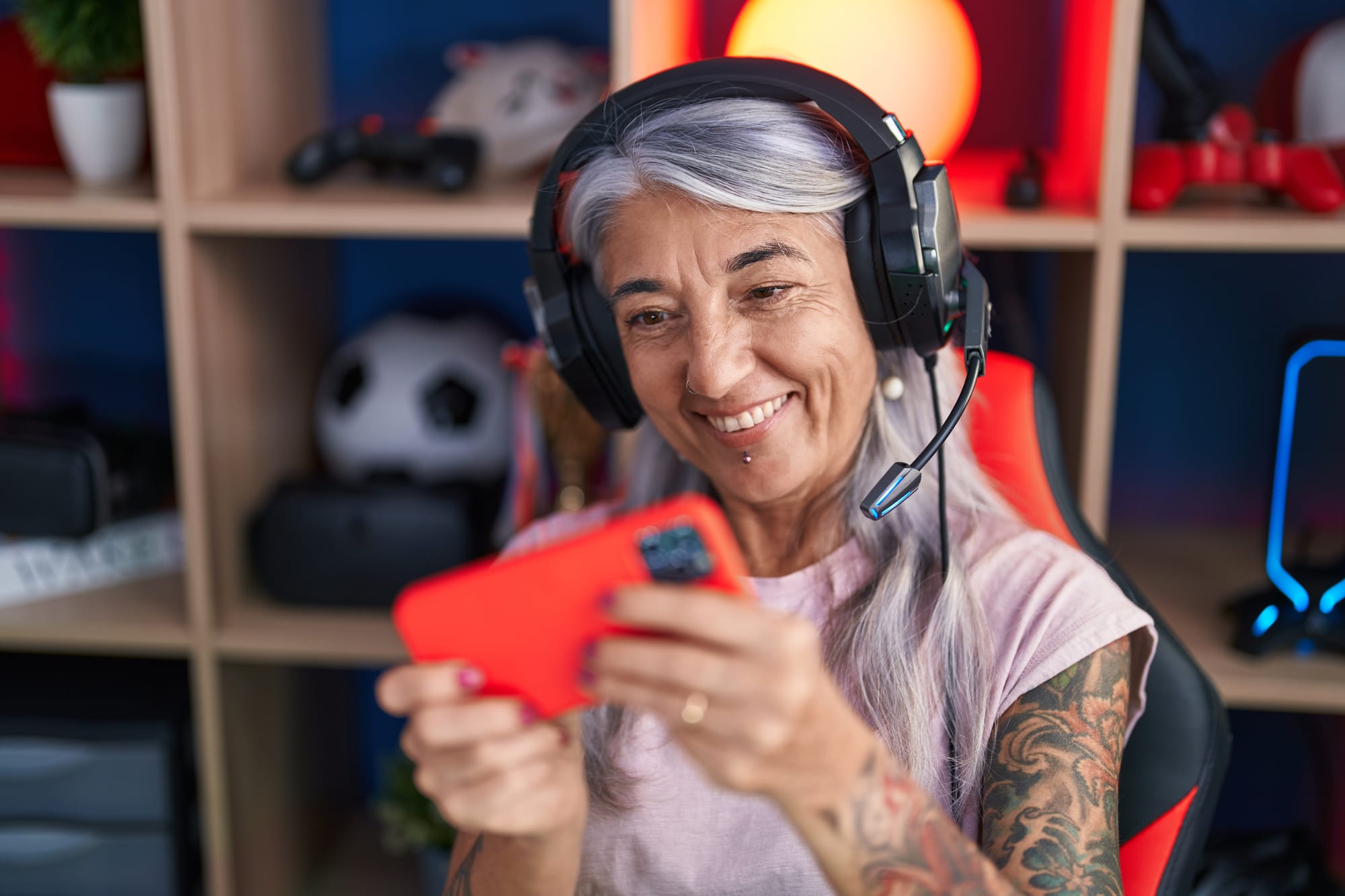Is 50 Too Old to Start Gaming? Opinion & Practical Advice
Short answer: Yes. Long answer: There's rarely been a better time to start gaming at 50+. You have time, money, patience, and a gaming industry that's finally grown up with you.

Affiliate/Advertisement Notice: This article contains affiliate links and sponsored content. We earn a small commission when you purchase through these links, which helps us to keep Silver Gamers running.
A question that I run into a lot on social media, is asked by people who still consider video games a "young person's hobby". They ask, not without a hint of shame, if it's okay to start playing video games (again) when you're 50 and older.
Long story short: Yes, it is absolutely fine to start gaming in your 50s. I would even go as far as to say there will rarely be a time in your life where it makes more sense, and here's why.
As of 2025, there are 3.32 billion gamers worldwide and the demographics might surprise you. The average player in the US is now 36 years old, with roughly 40% falling between 18 and 34, and close to 29% aged 50 or older (2025 Video Game Demographics: Stats & Trends to Know). You're not the exception joining some youth movement—you're part of a massive, mature demographic that the industry increasingly recognises and values.
Consider this: Over 200 million gamers worldwide are aged 65 and up, with nearly 650 million gamers aged 45 and older (2025 Gamers Report: Age, Gender, Location, Habits). Gamers over 50 tend to have more time than those in their 30s-40s—the kids are older or moved out, your career is established, you're not in survival mode anymore. You have disposable income to afford the console you actually want, not whatever's on sale. You can buy games at launch instead of waiting for them to hit the budget shelves. Most importantly, you don't have to prove anything—no K/D ratio anxiety, no streaming pressure, no need to "git gud". You've already collected real-life achievements.
And what a goldmine of games awaits you. While you were busy raising families and building careers, gaming evolved into something extraordinary. Games like The Last of Us, Red Dead Redemption 2, and Baldur's Gate 3 rival the best of prestige television and literature. Many classics are now remastered for modern consoles, better than ever. Blockbuster Game budgets rival Hollywood films, with stories and production values to match. Accessibility features that didn't exist in our youth now make gaming approachable for everyone, while subscription services like Game Pass let you try hundreds of games without committing £70($70) to each one.
You Have Advantages Younger Gamers Don't
Just as often I read about tired young adults in their 30s and 40s who ask if it's normal that they don't have the drive to play computer games anymore, that they fall asleep in front of their computers in the evening. While some might be able to hack their lives to success by changing their gaming time from evening to morning (hats off if you can pull it off), older gamers in their 50s or 60s are in most cases much better equipped to dabble back into gaming.
Gaming isn't just passive entertainment—it actively engages your mind in ways that Netflix simply cannot. You're discovering new worlds, solving puzzles, making strategic decisions, and connecting with like-minded people globally, all from your living room. Unlike passive media consumption, gaming requires active participation, keeping your mind sharp through constant problem-solving and strategic thinking.
What 50+ gamers have that exhausted 30-somethings lack is energy at the right times. You're not dragging yourself to the console after a 12-hour workday with young children demanding attention. You have patience earned through decades of navigating office politics and raising families—a difficult boss fight is nothing compared to what you've already conquered in life. You can appreciate the craft behind a well-designed game, recognising quality writing, innovative design, and artistic music in ways younger players might miss.
Most importantly, you're free from FOMO (Fear of Missing Out). You don't need to play everything on release day. Your gaming backlog can be carefully curated rather than stress-inducing. You understand boundaries, knowing when to turn it off because gaming is a chosen hobby, not an identity crisis.

How to Actually Start Gaming at 50+
Choosing the right platform is your first major decision. Here's the honest breakdown of your options in October 2025:
Nintendo Switch 2 (launched June 2025) might be perfect if you have nostalgia for Nintendo games or want to game with grandkids. At US$449 (or £449 in the UK), it plays on TV or as a handheld device with incredibly intuitive controls and a massive family-friendly library. The downside? It's less powerful than competitors and online features remain basic. But for pure fun and accessibility, it's hard to beat. Start with The Legend of Zelda: Tears of the Kingdom or the bundled Mario Kart World.
Buy Nintendo Switch 2 on Amazon
Xbox Series X/S offers the best overall value, especially with Game Pass. The Series S costs £299 ($399) while the full-power Series X costs £499 ($599). Game Pass Ultimate has jumped to £22.99 ($29.99) / month, but includes 400+ games. The beauty is you can try hundreds of games risk-free, figuring out what you actually enjoy without £70 ($70) gambles.
Buy Xbox Series X on Amazon
Buy Xbox Series S on Amazon
PlayStation 5 excels at story-driven exclusive games with the most immersive controller technology. The standard PS5 now costs £479 ($549.99) , with the Digital Edition at £349 ($499). PlayStation Plus Extra runs £99($134.99) / year, while Premium costs £119 ($159.99) / year. The exclusive games like God of War, The Last of Us and Spider-Man 2 are exceptional, but it's the most expensive ecosystem overall.
Buy Playstation 5 on Amazon
PC Gaming offers maximum flexibility and the best graphics, with mouse and keyboard often easier for certain game types. However, it requires more technical knowledge, costs significantly more upfront, and can be overwhelming for beginners. My advice? Start with a gaming console. PC gaming is graduate school—master the basics first.
My recommendation for new gamers: Xbox Series S + Game Pass Ultimate. A used Xbox Series S can found on eBay for around £200 ($200), while a month of Gamepass costs you £23(29$). You get to try hundreds of games risk-free and can figure out what you actually like without breaking the bank.
Buy Xbox Series S on Amazon
Buy Xbox Game Pass Ultimate on Amazon
The Right Games Make All the Difference
Start with familiar territory. If you loved Indiana Jones films, the new Indiana Jones and the Great Circle feels like playing one. Microsoft Flight Simulator offers meditative flying if you've always dreamed of piloting. Forza Horizon 5 provides accessible racing through gorgeous landscapes without stress.
For low-pressure experiences, try "cozy gaming": Stardew Valley offers farming simulation with zero pressure and endless charm. Animal Crossing: New Horizons lets you build an island paradise at your own pace. Even simple games like Unpacking—literally just unpacking boxes—prove surprisingly emotional and engaging.
Don't overlook story-driven adventures either. The Witcher 3 on Story Mode difficulty delivers epic fantasy rivalling Game of Thrones. Red Dead Redemption 2 presents the finest Western epic ever created in any medium. The Last of Us offers a post-apocalyptic father-daughter journey that will genuinely move you.

Setting Realistic Expectations
Your first week will feel clumsy. Modern controllers have more buttons than seems reasonable, and you'll die frequently. This is completely normal—muscle memory takes time to develop. By week two or three, you'll stop looking at the controller constantly. After a month, you'll finish your first game and feel genuinely accomplished. By month three, you'll know which genres appeal to you, which games respect your time, and which gaming communities feel welcoming.
Don't expect teenage reflexes or mastery of complex systems overnight. Do expect gradual improvement, moments of genuine joy, some frustration, and the discovery of experiences you didn't know you'd love.
Embrace Every Accessibility Feature
There is absolutely zero shame in playing on Easy or Story mode, using aim assist, turning on subtitles (game audio mixing is often terrible), increasing text size, or enabling invincibility modes when needed. These features exist because developers want you to enjoy their work. Modern games often hide easier modes behind euphemisms like "Explorer" or "Journalist"—these mean you won't die constantly and can focus on enjoying the experience.

Your Gamer Career Starts Now
Go for it. Life is short.
You've spent decades doing what you were supposed to do—building careers, raising families, being responsible. Gaming isn't frivolous. It's a hobby that engages your mind, provides genuine joy, and increasingly connects families across distances.
You might discover you love solving puzzles, exploring virtual worlds, or the satisfaction of mastering difficult challenges. Or maybe you'll just enjoy 30 minutes of cozy farming before bed. Your grandkids play Minecraft? Learn it and build together, even from 200 miles away. Your adult children game? This is a shared language you didn't know you could speak.
The gaming industry makes literal billions, and they're not getting them from teenagers with no money—they're making their money from people like you, with disposable income and time to finally enjoy a hobby that's matured into something extraordinary.
You're not too old. You're right on time.
Ready to take the plunge? Join our Silver Gamers community for judgment-free support, game recommendations perfect for mature players, and a group that understands that reflexes fade but the joy of gaming doesn't. Because at 50+, you've earned the right to game on your own terms.

FAQ - Questions You're Afraid to Ask on Social Media
Will I look stupid if I'm bad at games?
To whom? Single-player games have no audience—it's just you and the game. In multiplayer, you can mute everyone or play in beginner-friendly modes. And in mature gaming communities like ours, nobody judges skill level. You've navigated decades of real-life challenges; a video game can't diminish that. Besides, "bad" is relative—you're learning something new at 50+, which is admirable in itself.
Is gaming an expensive hobby?
It can be, but it doesn't have to be. A used Xbox Series S with a 3-month Game Pass subscription costs under £300 and gives you access to hundreds of games. Compare that to other hobbies—golf club memberships, theatre subscriptions, or cycling gear often cost far more. A £50 game offering 40-100 hours of entertainment works out to pennies per hour. Plus, there are brilliant free games, regular sales, and patient gamers can find last year's releases for £15-20.
Do I need a powerful PC, or should I just get a console?
For beginners over 50, consoles are generally the better choice. They're plug-and-play, cheaper (£250-500), and require no technical knowledge. PCs can be more powerful and versatile, but they require understanding specs, updates, and troubleshooting. Start with a console—you can always explore PC gaming later if you fall in love with the hobby.
What if I have arthritis, poor vision, or other physical limitations?
Modern gaming has transformed accessibility. Consoles now include text-size options, button remapping, aim assist, and even voice controls. Specialized controllers like Xbox's Adaptive Controller accommodate various physical needs. Many games offer difficulty settings that reduce button-mashing. Gaming with arthritis, reduced vision, or other limitations is not only possible—it's increasingly well-supported.
Will gaming make me anti-social or isolate me?
Only if you choose it to be! Gaming can be deeply social through online co-op, voice chat with distant friends, or local multiplayer with family. Many of our members specifically game to stay connected with grandchildren or old friends across the country. That said, it can also provide peaceful solo time when you need it. You control the social dial entirely.
I tried gaming years ago and didn't like it. Has it really changed?
Dramatically. Modern gaming bears little resemblance to the 1990s or even 2000s. Today's games feature cinematic stories, mature themes, accessibility options, multiple difficulty settings, and genres that didn't exist before (cozy games, walking simulators, narrative adventures). If you bounced off gaming 20 years ago, it's genuinely worth a fresh look—the medium has evolved as much as film or television.
How do I know which games I'll actually enjoy?
Start with your other interests. Love detective novels? Try adventure games or mysteries. Enjoy gardening? Cozy farming sims might appeal. Subscription services like Game Pass (Xbox) or PS Plus let you sample dozens of genres without buying individual games. Our game recommendation guides are also designed specifically for mature players discovering their tastes.
What if my partner / family thinks gaming is childish?
Gaming is no more childish than watching films, reading novels, or doing crosswords—all forms of entertainment and mental engagement. The average gamer is now 35 years old, and 40% of all gamers are over 35. You might share statistics, invite them to watch you play a story-driven game, or simply own your hobby with confidence. Many partners become curious once they see the actual content—modern games tackle themes like grief, aging, and moral complexity.
I'm worried I won't have the reflexes for modern games. Am I too slow?
Reflexes matter for competitive shooters, but most games reward strategy, patience, and pattern recognition—skills that often improve with age. Many brilliant games require zero fast reflexes: puzzle games, turn-based strategy, adventure games, and city builders. Even action games now include assist modes that compensate for slower reaction times. You're not competing with teenagers; you're playing for your own enjoyment.
How much time do I need to commit to actually enjoy gaming?
Far less than you think. Many modern games respect your time with frequent save points, suspend features, and session-friendly design. You can have a meaningful gaming experience in 20-30 minutes. Some of our members play for hours on weekends; others grab 15 minutes here and there. There's no minimum time requirement—gaming scales to fit your life, not the other way around.
What if I get stuck and can't progress in a game?
Unlike the old days of cryptic design, modern games include hints, adjustable difficulty, and extensive online guides. Our community is specifically here to help without judgment. Most games now have accessibility options that let you skip particularly challenging sections if you want to experience the story without frustration. Getting stuck isn't failure—it's an opportunity to engage with the community or adjust your approach.
Can gaming actually benefit me mentally and physically?
Research increasingly shows that gaming can improve cognitive function, hand-eye coordination, problem-solving skills, and even help maintain mental acuity as we age. Social gaming combats loneliness and isolation. That said, balance matters—like any hobby, moderation is key. Gaming is neither miracle cure nor dangerous vice; it's simply another form of engaging entertainment with potential benefits when enjoyed responsibly.
I'm embarrassed to admit I want to try gaming. Is this normal?
Completely normal, and you're far from alone. Cultural stigma around "older" people gaming is outdated nonsense, but it still exists. The embarrassment typically vanishes once you start—you'll quickly realize thousands of people your age are gaming and loving it. This entire community exists because mature gaming is finally getting the recognition it deserves. Your curiosity isn't something to hide; it's something to celebrate.
What are you waiting for? Your gaming journey starts today. Drop a comment below with what kind of games interest you, and our Silver Gamers community will help you find the perfect starting point.

